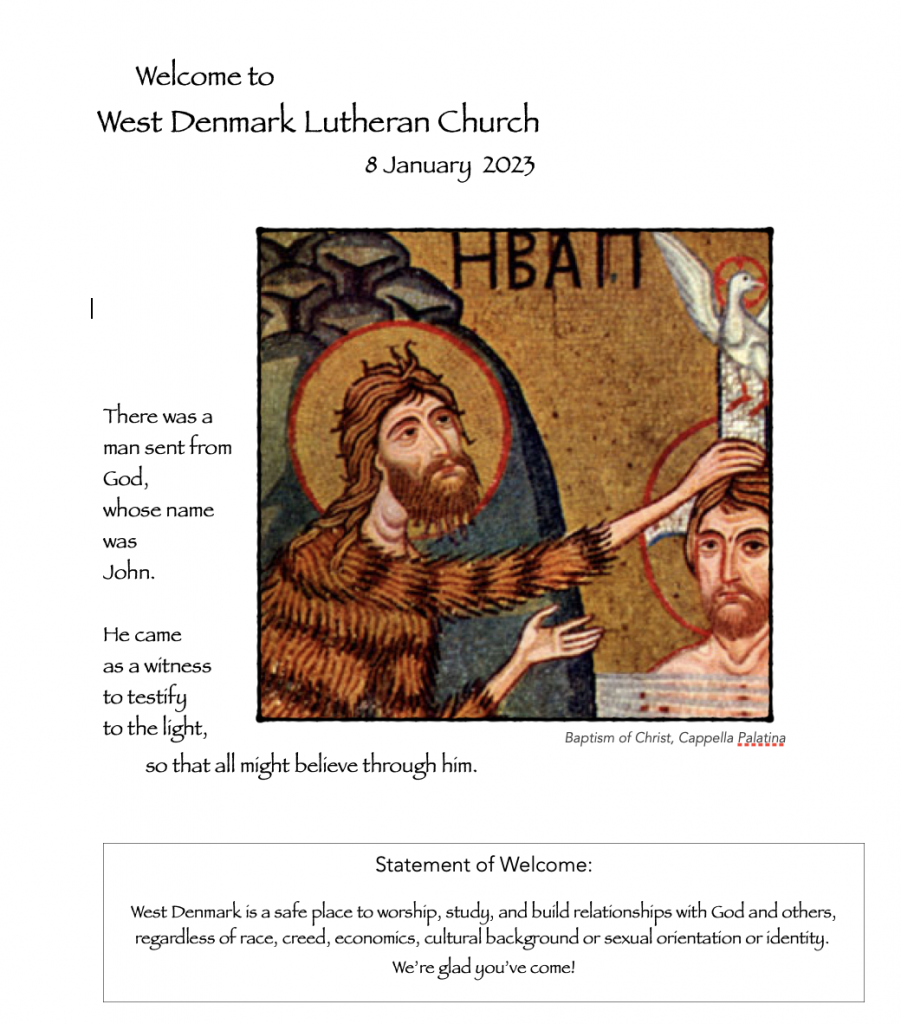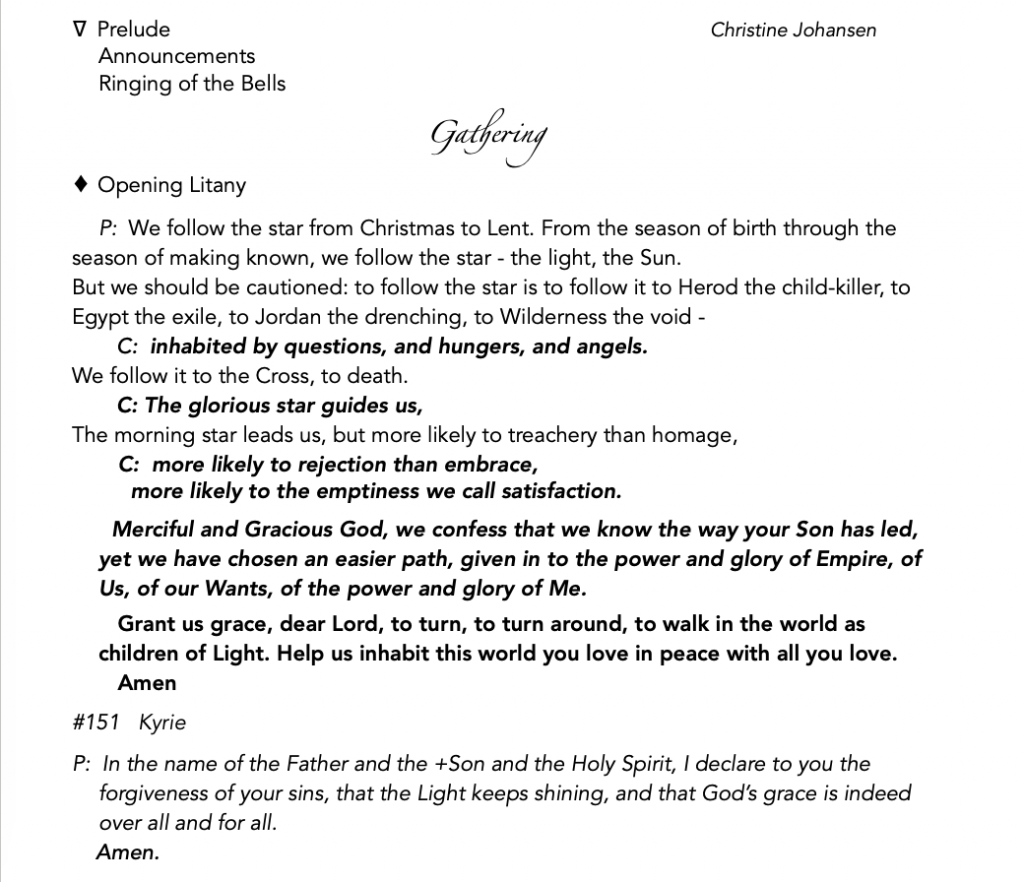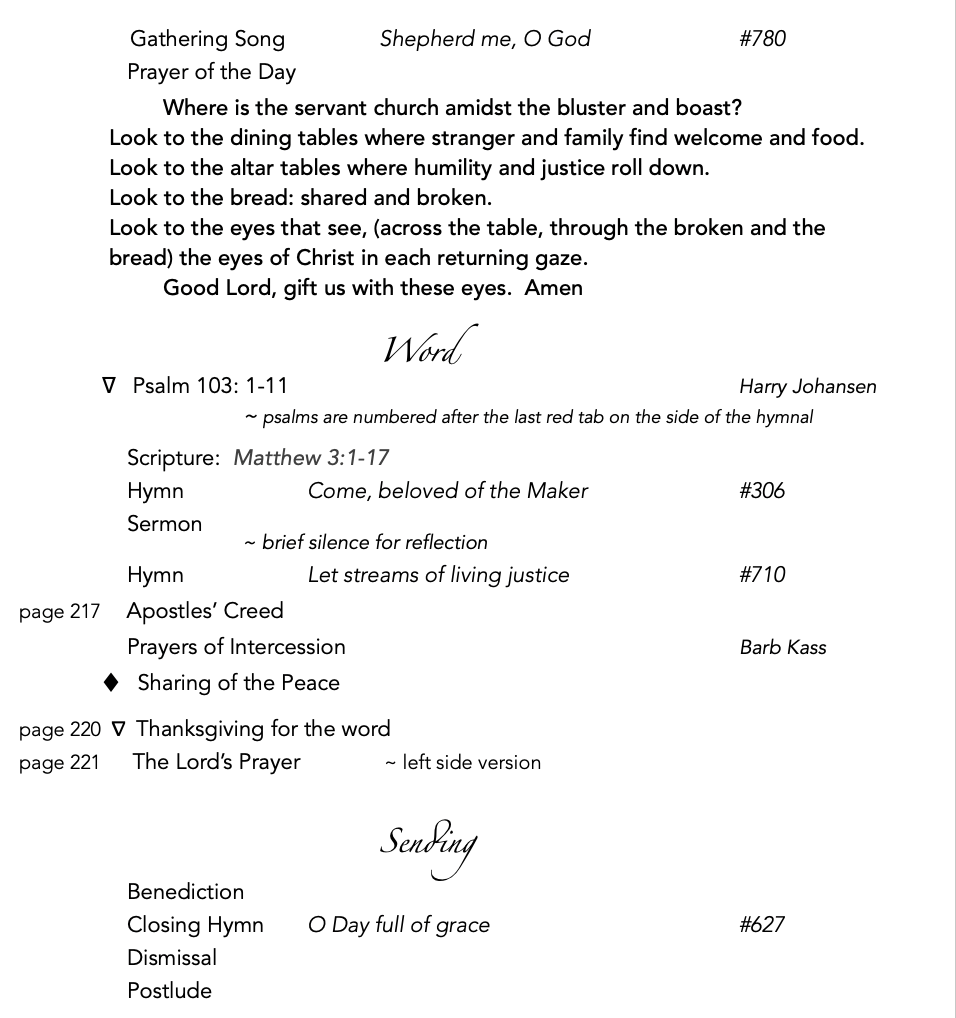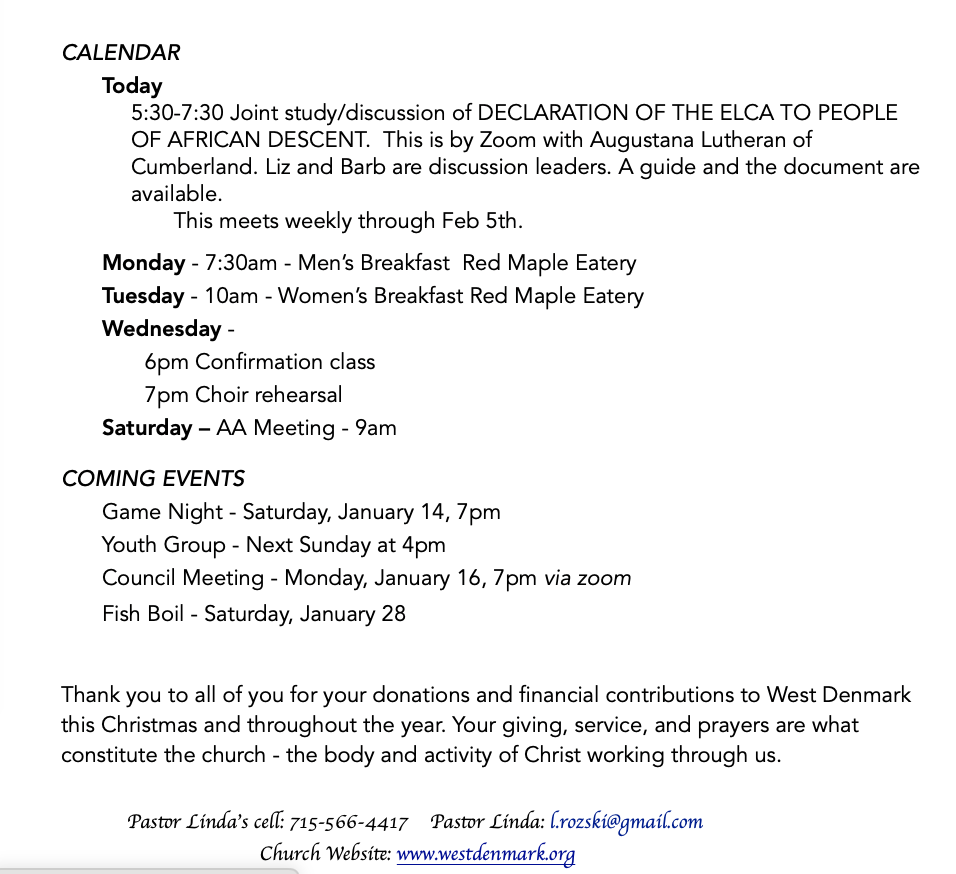Audio Recording



Matthew 3:1-17
In those days John the Baptist appeared in the wilderness of Judea, proclaiming, 2“Repent, for the kingdom of heaven has come near.” 3This is the one of whom the prophet Isaiah spoke when he said, “The voice of one crying out in the wilderness: ‘Prepare the way of the Lord, make his paths straight.’” 4Now John wore clothing of camel’s hair with a leather belt around his waist, and his food was locusts and wild honey. 5Then the people of Jerusalem and all Judea were going out to him, and all the region along the Jordan, 6and they were baptized by him in the river Jordan, confessing their sins.
7But when he saw many Pharisees and Sadducees coming for baptism, he said to them, “You brood of vipers! Who warned you to flee from the wrath to come? 8Bear fruit worthy of repentance. 9Do not presume to say to yourselves, ‘We have Abraham as our ancestor’; for I tell you, God is able from these stones to raise up children to Abraham. 10Even now the ax is lying at the root of the trees; every tree therefore that does not bear good fruit is cut down and thrown into the fire. 11“I baptize you with water for repentance, but one who is more powerful than I is coming after me; I am not worthy to carry his sandals. He will baptize you with the Holy Spirit and fire. 12His winnowing fork is in his hand, and he will clear his threshing floor and will gather his wheat into the granary; but the chaff he will burn with unquenchable fire.”
13Then Jesus came from Galilee to John at the Jordan, to be baptized by him. 14John would have prevented him, saying, “I need to be baptized by you, and do you come to me?” 15But Jesus answered him, “Let it be so now; for it is proper for us in this way to fulfill all righteousness.” Then John consented. 16And when Jesus had been baptized, just as he came up from the water, suddenly the heavens were opened to him and he saw the Spirit of God descending like a dove and alighting on Jesus. 17And a voice from heaven said, “This is my Son, the Beloved, with whom I am well pleased.”
Why did Jesus choose baptism?
This question takes up most of the commentaries and podcasts that cover chapter 3. Their answers vary quite a bit depending on the perspective that’s taken. Within the gospel’s story, Jesus tells John it’s part of God’s plan. It is to ‘fulfill all righteousness’. However, none of the commentators could explain what that means. There wasn’t an ancient category of behavior that fulfilled all righteousness. There is no scriptural mandate for the Messiah to be baptized. And, within the story and within Christian sensibilities, Jesus had nothing of which to repent. He is the model of righteousness – the fulfillment of it in his person.
Nevertheless, Jesus seems to be saying, “Ya know, I’ve got a feeling about this… Let’s just do it.” And then the heavens open.
I’ve read that the kind of baptism John was enacting was unique. There were rituals of bathing for purity and spiritual cleansing – rituals for forgiveness of deeds and misdeeds, but not this once-and-for-all forgiveness of SIN. The typical rites were something one would expect to repeat as needed. John was expecting a change: a truly altered mode of living, an existential reordering as the result or consequence of his baptism. It was a prophet’s call: “The time is at hand. Change! And here’s what to do. Come down into the water, come into the river that our people crossed from wilderness into the promised land, the river that healed Namaan, the Jordan River that creates our fertile valley. Come wash and be reborn, refreshed, redone.”
Those commentators who are speaking about the gospel from outside of the story, say Matthew was connecting Old Testament expectations with New Testament promises: John, styled as a Hebrew prophet, humbles himself and submits to Jesus as the Messiah, while Jesus recognizes the authority of John to fulfill God’s word. They each highlight the work of the other. The baptism is plying those strands together.
They also say it was written this way to encourage the followers and disciples of John – who seem to be many – to join the Jesus movement which was forming at the time this gospel was written – some 50 years after Jesus’ death, 53 years after the baptism event. Unlike in Luke and Mark, Matthew gives John and Jesus the same words; “Repent, for the kingdom of heaven is at hand.” And in Matthew they both call their opponents a brood of vipers. In fact, John the Baptist’s movement was in some sense a competitor of early Christianity, offering Jews an alternative way. Christianity did emerge out of the John’s ministry, and some of Jesus’ first followers had been his. Matthew and the other evangelists wanted to make clear the connection they saw between these two distinct calls: John’s call for repentance at the nearness of the kingdom and the call of Jesus as the Messiah within that kingdom.
After all these years of preaching and studying, I’m still surprised at how political, or strategic, or tactical, or agenda-driven the gospels were/are. They are not novels, they are not histories, they are not memoirs, they are not innocent or neutral. The gospels are highly crafted, polemic, documents of persuasion. They are meant to convince their hearers and readers of an alternate reality, a hidden realm just as real and urgent as Empire. They are meant to change lives. And John is the perfect opening act for the story they will tell.
Another somewhat pedantic motivation for why Jesus was baptized, is that it had to begin somewhere. As Jeff read last week, the small child Jesus was moved from place to place, guided by the dreams of Joseph in order to keep him safe, and the little family settled finally in Nazareth, in Galilee. Little Jesus…
…. And … a transition is needed. “In those days, John the Baptist appeared in the wilderness of Judea proclaiming, “Repent, for the kingdom of heaven has come near..” .… and then one day Jesus came from Galilee to John at the Jordan to be baptized. And after that he went into the wilderness, led by the Spirit of God to be tempted, and when he heard that John had been arrested he went back to Galilee and moved to Capernaum, and from that time on Jesus began to proclaim, “Repent, for the kingdom of heaven has come near.”
It had to begin somewhere! The evangelists needed some jumping in point. And now we’re caught up and we learned a few things along the way.
It is interesting though, that all four gospels – even John who is the outlier – and Peter’s speech in Acts 10 – all preface Jesus’ ministry with an account of John. For some reason, they saw it necessary to begin the good news of Jesus with this prophet. The Jewish historian Josephus, after praising John’s piety and religious leadership, notes that Herod did away with him out of fear that political upheaval might result from John’s ministry. Josephus says similar things, but less actually, about Jesus.
So, the Baptizer and the baptism were essential – not simply convenient story-telling devices – essential, even if we don’t quite see it.
But then, the question shifts a bit. Why do we choose baptism? What does it mean for us?
It’s too big a question, of course, and the answers/responses could take too long. What it is, is one point we can touch on. And what it is not is another one. We’ll start there, with what it is not.
Baptism is not magic. It does not produce an indelible sign on our foreheads to be seen by the angels and archangels and cherubim and seraphim on the last day when the stars are called home — well, maybe it does that (who’s to know), but it’s not a magic marker to separate sheep from goats. I grew up believing that you had to be baptized to go to heaven. But that’s not in the Bible. I’ve checked.
The gospel of Mark, in one of the extra, non-original endings, comes the closest to a transactional relationship between baptism and salvation, saying, “The one who believes and is baptized will be saved.” I looked up the 84 citations of the word in my Greek New Testament concordance, and nowhere does it say baptism is for salvation – or even why we are to baptize or be baptized into Christ, except for the forgiveness of sin. Paul talks about the parallel to Christ’s dying and rising – if we are baptized into Christ we will also rise with Christ. The main difference between John and Jesus’ baptisms seems to be in connection with the Holy Spirit. It’s not as noticeable as it was in Jesus’ baptism, but, especially in Acts, the Spirit of God is attracted to the water and hovers near.
So, baptism isn’t a golden ticket. It’s not an insurance policy. And it’s not transactional.
Also, it has meant different things in different periods of history within the Christian tradition, and still does between denominations. Practices and beliefs change – and so, is one denomination correct and the others false? Or is the practice or wording or belief from one period of history correct over against another? Or, do we trust finally that baptism is God’s sign to us, God’s gift to us as a reminder of the preciousness of life and water and forgiveness and the holy, uniting Spirit for community gathered in Christ? Can we receive it simply as gift and not try to manage the outcome?
I said it’s not magic, but it is part of the mystery of God’s incarnational love. Baptism is an elemental, sacred sign of inclusion, of welcome into a community of faith, a means of grace uniting the church of all times and places, a naming and claiming into the people of God. Church traditions, policies and doctrines have more to say about it, claim more for it and from it, have added more layers, but this is good for today.
The thing that I am clear about in my head and heart, is that we are not God, and that we are not in charge of salvation, and that we don’t really know what salvation even is. So baptism – or any other requirement that we might set up to fulfill all righteousness – is a human construct, and one that may or may not be a good idea, but is not proof of a prerequisite, or in any other way known to be what God wants of us. We truly don’t know what God wants of us, although I’m drawn to Micah’s “do justice, love kindness, and walk humbly with God” – and so we live out of whatever love and generosity of spirit and fullness of soul we can bring to the world and to our relationships. Baptism won’t automatically make you a better person. John’s cry for change, for repentance, still holds. But baptism does connect us to one another, to the faithfulness of the community, to the prayers and thoughts and love of those who gather weekly to celebrate and sorrow and praise God together. And there is healing in that. There is forgiveness in that, there is transformation in that, there is sacred love, divine love, evident in the depth and breadth of companionship we feel as Christians who gather together. And over time, that can change your life.
